In the wake of the U.S. Supreme Court’s decision in Dobbs v. Jackson Women’s Health Organization, which overturned Roe v. Wade, the 1973 decision that had protected abortion rights nationally, Americans remain more in favor of access to abortion than opposed to it.
Views on Abortion Legality, How Abortion Affects Voting, and the Roe Overturn
Abortion Legality
In a survey conducted June 24-26, 2022, after the Dobbs decision was announced, 65% of Americans say abortion should be legal in most or all cases, including 33% who say it should be legal in all cases and 32% who say it should be legal in most cases. One-third of Americans (33%) say abortion should be illegal in most or all cases, including 25% who say it should be illegal in most cases and 8% who say it should be illegal in all cases.
PRRI has tracked opinion on this question since 2010, when 55% of Americans said abortion should be legal in most or all cases and 42% said it should be illegal in most or all cases. Much of the change has been in the “all cases” responses: support for legal abortion in all cases has slowly ticked up, from a low of 18% in 2010 and 2011 to the current 33%. Most recently, in March 2022, 28% said abortion should be legal in all cases. Conversely, the proportion of Americans who say abortion should be illegal in all cases has slowly declined, from 15% in 2010, and a high of 19% in 2014, to its current level of 8% (unchanged from 9% in March 2022).
Republicans are least likely to say abortion should be legal in most or all cases (35%), but vast majorities of independents (69%) and Democrats (88%) say it should remain legal. Republicans have stayed consistent since 2010 (when 35% said it should be legal in most or all cases), and independents have moved only slightly (from 64% in 2010). Democrats have become considerably more supportive of abortion legality, however, with 71% saying it should be legal in most or all cases in 2010, compared with nearly nine in ten in mid-2022.
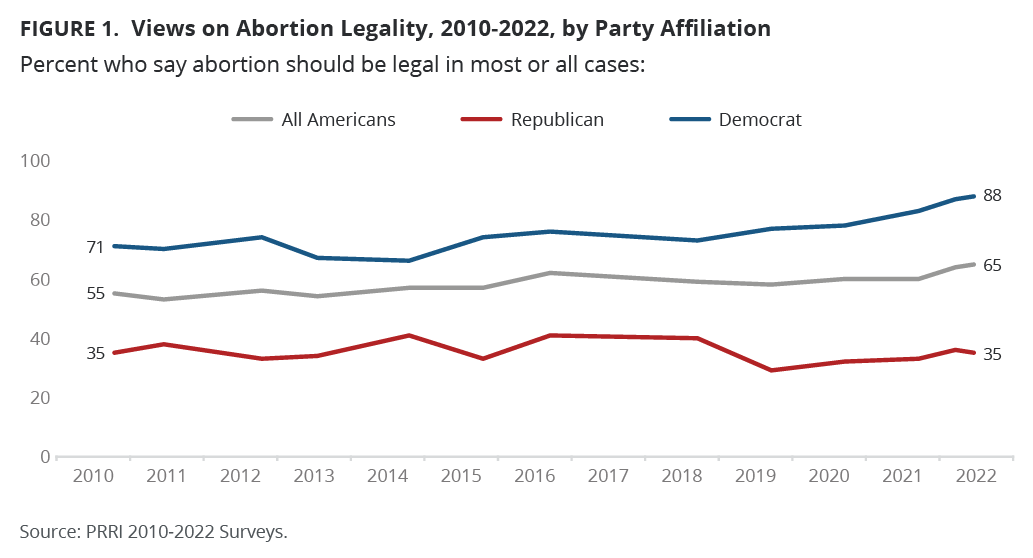
Among different religious affiliations, white evangelical Protestants are significant outliers, with one in four saying abortion should be legal in most or all cases (25%), a proportion that has been generally consistent since 2010 (28%). By contrast, 64% of white Catholics, 69% of white mainline (non-evangelical) Protestants, 75% of Black Protestants, 75% of Hispanic Catholics, 82% of non-Christian religious Americans, and 84% of religiously unaffiliated Americans support abortion legality in most or all cases. All of these latter groups have shifted slightly in favor of abortion legality since 2010, but, owing to small sample sizes, many of the differences are not statistically significant.
When asked how important religion is in their lives, 15% of Americans say it is the most important thing in their life, 36% say it is one among many important things in their life, 18% say it is not as important as other things in their life, and 29% say it is not important in their life. Opinions on abortion legality are starkly divided by these categories. Fewer than three in ten of those who say religion is the most important thing in their life (29%) say abortion should be legal in most or all cases, compared with 57% among those who say it is one of many important things, 76% of those who say it is not as important as other things, and 88% of those who say it is not important.
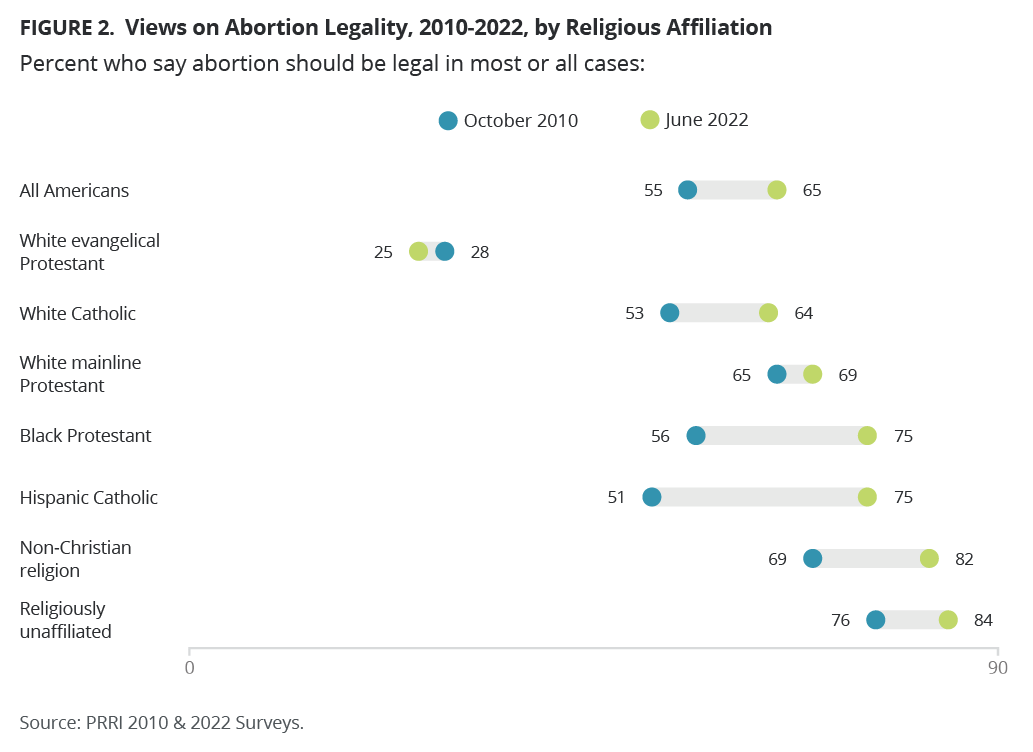
Among racial and ethnic groups, Black Americans are most supportive of abortion legality in most or all cases (75%), with 68% of multiracial, Asian, and Native Americans in agreement, as well as 66% of Hispanic Americans and 62% of white Americans. White Americans are divided by education, with 59% of those without a four-year college degree favoring abortion legality in most or all cases, compared with 68% of those with a four-year college degree or higher level of education.
Women (67%) are more likely than men (62%) to support legal abortion in most or all cases. There are not significant differences by age: 64-67% of every age group say abortion should be legal in most or all cases. Gender differences do vary by age group, however. Seven in ten women ages 18-29 (70%) support legal abortion in most or all cases, compared with 58% of men in that age group. The gap closes in the 30-49 age group, in which 67% of women and 66% of men favor abortion legality. Women in the 50-64 age range are more likely to support abortion legality than are men in that age group (69% vs. 58%), but then the gap closes again among those over 65 (63% women, 65% men).
Those who know someone who has had an abortion, including themselves, a friend, a family member, or someone else, are more likely than those who do not know anyone who has had an abortion to say it should be legal in most or all cases (72% vs. 59%). Half of Americans (50%) say they know someone who has had an abortion.
Voting Based on Abortion
Nearly one-third of Americans (32%) say they will only vote for a candidate who shares their views on abortion, compared with 46% who say a candidate’s position on abortion is just one of many important factors and 19% who do not see abortion as a major issue when voting. The proportion who say a candidate must share their views has increased considerably, from 20% in 2020. PRRI has asked this question since 2018, and the previous high mark was 25%, in 2019. The proportion who do not see abortion as a major issue is, likewise, at a low mark — in 2020, 26% said it was not a major issue, and the previous low mark was 22% (also in 2019).
In a substantial reversal, slightly more Americans who say abortion should be legal in most or all cases also say they will only vote for a candidate who shares their views (34%) than do those who say it should be illegal in most or all cases (31%). In 2020, 15% of those who supported abortion legality in most or all cases said they would only vote for a candidate who shares that view, compared with 29% among those who said abortion should be illegal in most or all cases. Additionally, those who know someone who has had an abortion (37%) are more likely than those who do not (29%) to say they will only vote for someone who shares their views on the issue.
The same trend is apparent by party affiliation, with Democrats becoming more activated on the issue. In the immediate aftermath of the Dobbs decision, 43% of Democrats say they will only vote for a candidate who shares their views on abortion, compared with 17% in the fall of 2020. Independents have become eleven percentage points more likely to say they will only vote for a candidate who shares their abortion views (25% vs. 14% in 2020), but Republicans have held steady (31% vs. 32% in 2020).
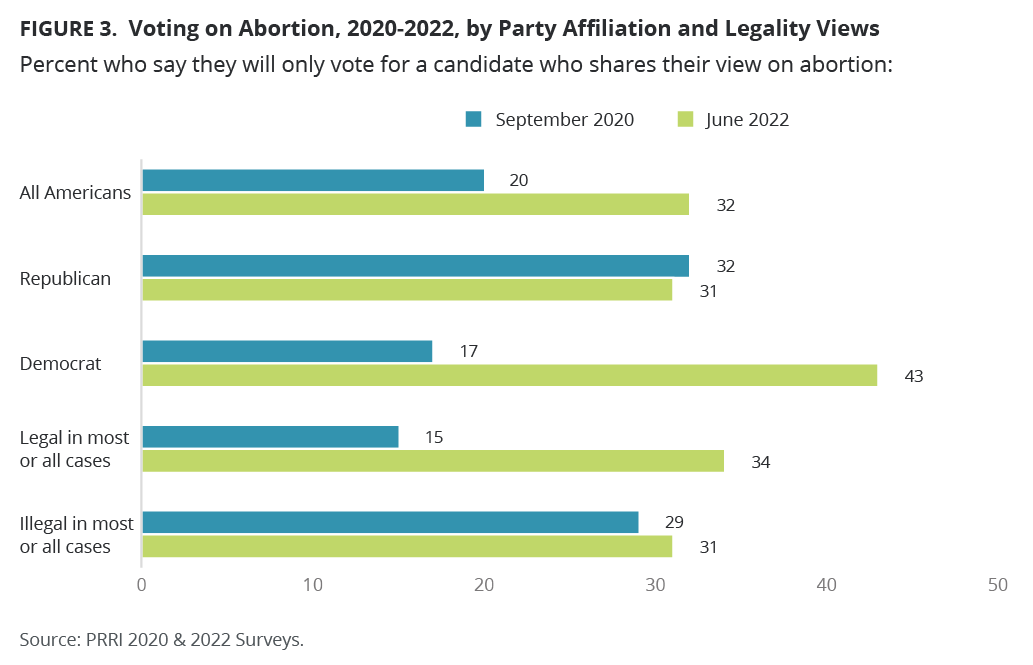
White evangelical Protestants (37%) remain among the most likely groups to say they will only vote for candidates who share their views on abortion, and this is unchanged since 2020 (36%). However, they are now joined by 40% of non-Christian religious Americans and 36% of religiously unaffiliated Americans who say the same. The proportions of these latter two groups that say they will only vote for candidates who share their view on abortion have more than doubled since 2020 (18% and 17%, respectively). White Catholics (31% vs. 20% in 2020), white mainline Protestants (27% vs. 17% in 2020), Black Protestants (24% vs. 14% in 2020), and Hispanic Catholics (30% vs. 20% in 2020) have become more likely to say this as well.
The number of those saying they will only vote for candidates who share their views on abortion has increased by around 10 percentage points in every racial and ethnic group since 2020. Around one-third of Asian, Native, and multiracial Americans (35% vs. 18% in 2020), white Americans (33% vs. 22% in 2020), and Hispanic Americans (32% vs. 21% in 2020) say only those who share their abortion views will earn their vote, and 24% of Black Americans (15% in 2020) say the same.
Notably, white Americans with at least a four-year college degree (37%) are more likely than those with less formal education (31%) to say they will only vote for a candidate who shares their views on abortion. This is a change from 2020, when there was no statistically significant difference between the groups (21% and 22%, respectively).
Women (36%) are more likely than men (28%) to say they will only vote for someone who shares their views on abortion, but both increased from 2020 (22% and 18%, respectively). Democratic women (47%) are particularly likely to say this, compared with Republican women (33%) and independent women (27%), while men across parties are consistently less likely to say so (37%, 28%, and 23%, respectively). Additionally, young Americans ages 18-29 (36%) are now more likely than other age groups (31% 30-49, 32% 50-64, 32% 65 and over) to say this, whereas in 2020 there were no significant differences by age.
Opposition to Overturning Roe v. Wade
Most Americans oppose the Supreme Court’s decision to overturn Roe (63%), including a plurality who strongly oppose it (44%), while about one-third favor it (34%). These numbers are mostly unchanged from prior to the overturn: in March 2022, 61% opposed a then-hypothetical Roe overturn and 36% favored it.
While topline views have remained the same, there has been continued polarization between partisans and some religious groups, with the groups going further into their expected camps. According to the June survey, 33% of Republicans oppose the Roe overturn, compared with 48% who opposed a hypothetical overturn in March. On the other side, 86% of Democrats oppose the overturn, whereas 74% opposed a hypothetical overturn in March. Two-thirds of independents (66%) oppose the decision, a slight increase from 61% who opposed a hypothetical overturn in March.
Similar shifts have occurred by religious affiliation as well. White evangelical Protestants are least likely to oppose the overturn (30%), even though 46% had opposed it in March. Sizeable majorities of other religious affiliations, including Black Protestants (76%), the religiously unaffiliated (75%), Hispanic Catholics (72%), non-Christian religious Americans (69%), white mainline Protestants (68%), and white Catholics (62%), are opposed to the Supreme Court’s action in overturning Roe. All of these groups except non-Christian religious Americans and the religiously unaffiliated have become more likely to oppose the overturn since March.
Those who say religion is the most important thing in their life are least likely to oppose overturning Roe (37%), compared to 60% of those who say religion is one of the most important things, 70% of those who say it’s not as important as other things, and 78% who say it is not important at all.
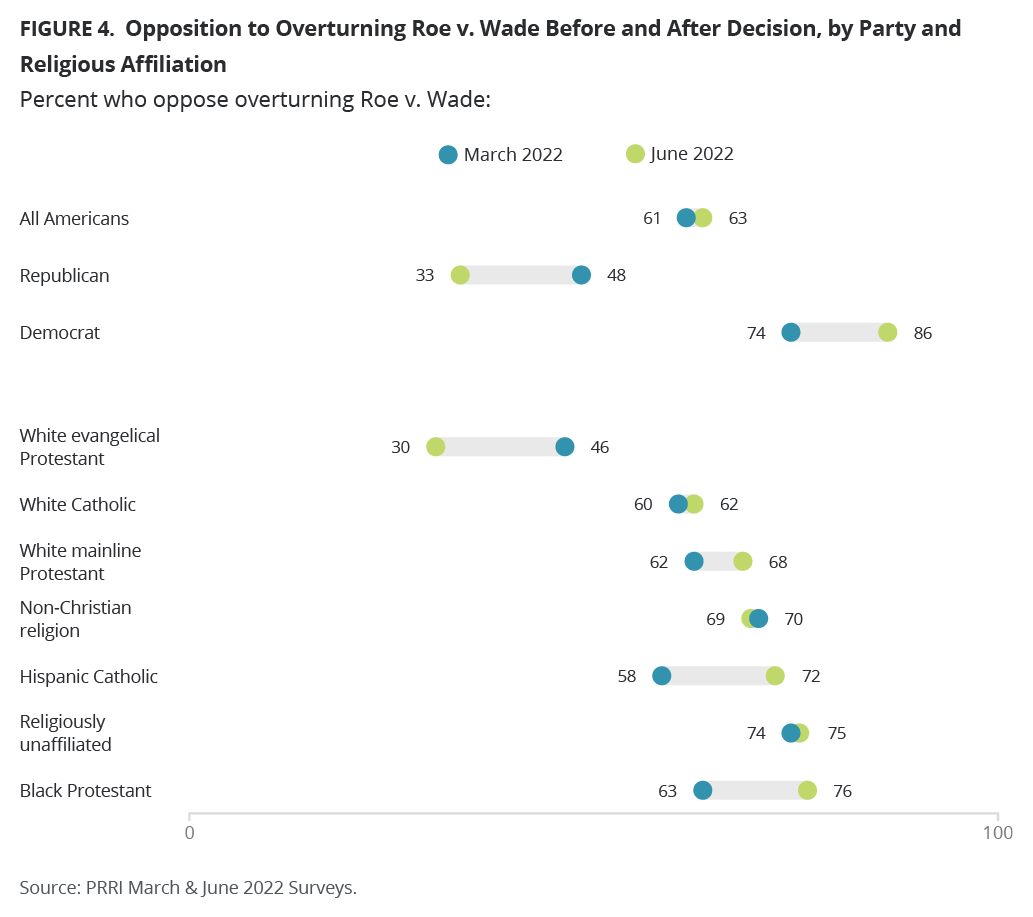
A majority of Americans (53%) say Congress should pass a national law preserving a right to abortion, compared with 12% who say Congress should pass a national law banning abortion. About one-third (32%) say abortion law should be left to the states. Most of those who oppose the Roe overturn say Congress should pass a law preserving the right to abortion (74%), while most who favor the Roe overturn say it should be left to the states (59%). One in four who favor the Roe overturn (24%) say Congress should ban abortion nationally.
Most of those who say abortion should be legal in most or all cases oppose overturning Roe (83%), while those who say abortion should be illegal in most or all cases are much less likely to oppose the overturn (28%). Additionally, those who know someone who has had an abortion (68%) are more likely to oppose the overturn than those who do not (59%).
Views on Specific Abortion Policies
Restricting What Types of Birth Control Can Be Used to Prevent Pregnancy
The vast majority of Americans oppose laws that would restrict what types of birth control can be used to prevent pregnancy (84%), and a solid majority indicate they strongly oppose such laws (56%). Only 14% of Americans favor restrictions on birth control.
Large majorities of Democrats (90%), independents (86%), and Republicans (77%) oppose laws that restrict what types of birth control can be used to prevent pregnancy. Similarly, large majorities across all religious groups oppose these laws. White evangelical Protestants (73%) and Americans who say that religion is the most important thing in their lives (71%) are least likely to oppose these laws.
Vast majorities of Americans across race, gender, education, age, and views on abortion oppose laws that restrict what types of birth control can be used to prevent pregnancy.
Making It a Felony to Seek or Perform an Abortion
Majorities of Americans oppose laws that make it a felony crime to seek or perform an abortion, but they are more likely to oppose criminalizing seeking an abortion (80%) than performing an abortion (74%).
Democrats are equally likely to oppose laws that make it a felony to seek an abortion (93%) as they are to oppose making it a felony to perform (92%) an abortion. Republicans (61%) and independents (85%) are notably more likely to oppose making it a felony to seek an abortion than to oppose making it a felony to perform an abortion (48% and 78%, respectively).
With the exception of white evangelical Protestants, majorities of religiously affiliated Americans oppose laws that make it a felony to seek or perform an abortion: religiously unaffiliated Americans (91% and 88%), Black Protestants (88% and 83%), white mainline Protestants (88% and 82%), Hispanic Catholics (86% and 80%), and members of non-Christian religions (85% and 85%). White Catholics (81% and 73%) and white evangelical Protestants (58% and 41%) are notably more likely to oppose laws that make it a felony to seek an abortion than they are to oppose laws that make it a felony to perform an abortion.
Americans who say that religion is the most important thing in their lives are also more likely to oppose laws that make it a felony to seek an abortion than to oppose laws that make it a felony to perform one (52% vs. 41%).
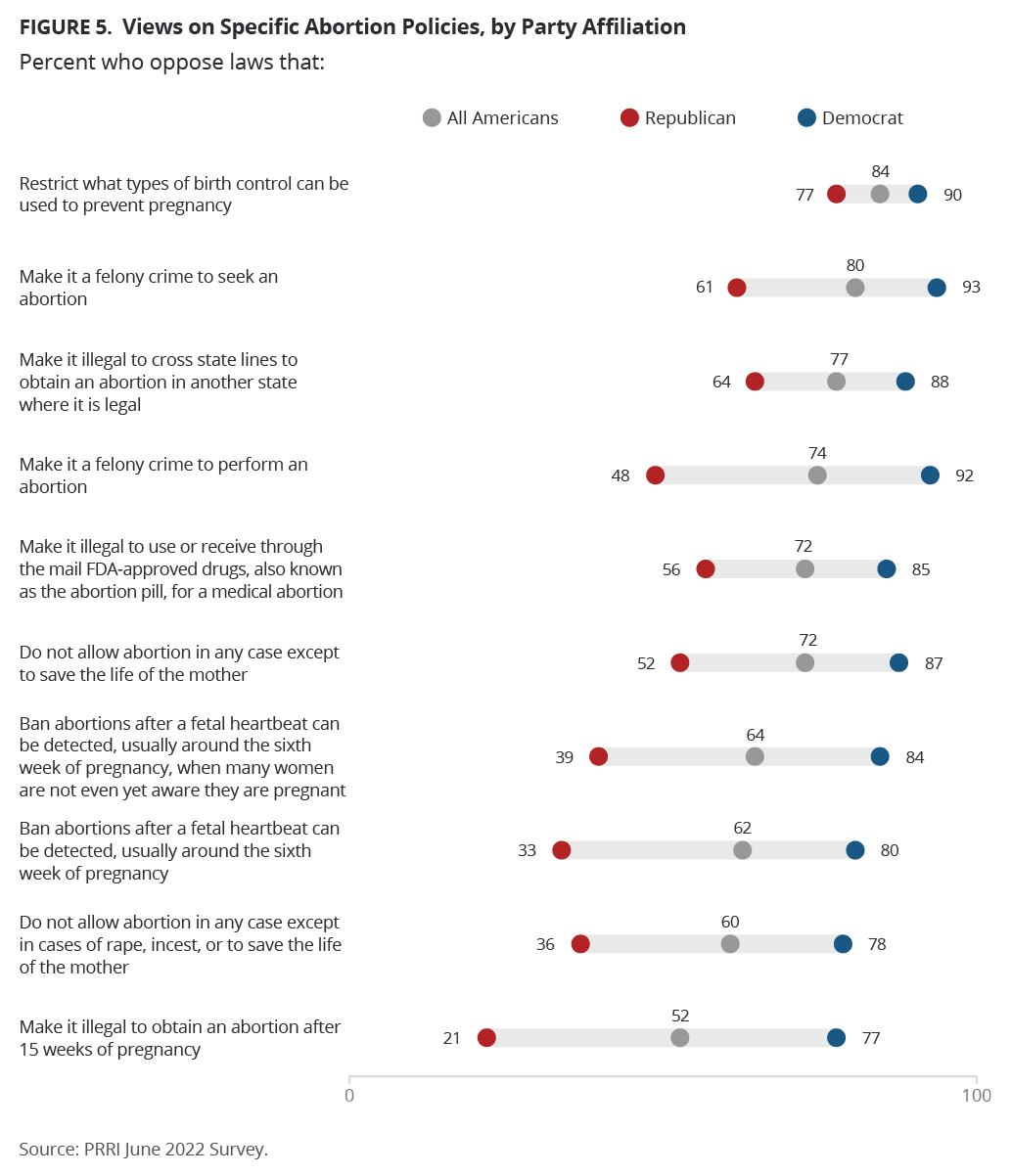
Crossing State Lines to Obtain an Abortion in Another State
The vast majority of Americans oppose laws that would make it illegal to cross state lines to obtain an abortion in a state where it is legal (77%), and half of Americans say they strongly oppose them (50%). About one in five Americans (20%) favor such laws.
Nearly nine in ten Democrats (88%), 84% of independents, and about two-thirds of Republicans (64%) oppose laws that make it illegal to cross state lines to obtain an abortion in a state where it is legal.
A majority of white evangelical Protestants (55%) oppose laws that make it illegal to cross state lines to obtain an abortion in another state, but other religious groups have higher levels of opposition: the religiously unaffiliated (89%), white mainline Protestants (85%), white Catholics (81%), Hispanic Catholics (81%), Black Protestants (78%), and members of non-Christian religions (78%).
Abortion Pills
About seven in ten Americans (72%) oppose laws that make it illegal to use or receive through the mail FDA-approved drugs for a medical abortion, also known as the abortion pill. One in four Americans (26%) favor such laws.
Democrats (85%) are notably more likely than independents (75%) to oppose laws that make it illegal to use FDA-approved drugs for a medical abortion or receive them through the mail. Republicans (56%) are least likely to oppose these laws, although a majority do oppose them.
With the exception of white evangelical Protestants (48%) and those who say that religion is the most important thing in their lives (51%), majorities of other religious groups and across race, gender, education, age, and abortion views oppose making it illegal to use or receive through the mail FDA-approved drugs for a medical abortion.
Banning Abortion Except to Save the Life of the Mother and in Cases of Rape or Incest
Only one in four Americans (25%) support banning abortion in all cases except to save the life of the mother, while 72% oppose this type of ban. Slightly more — but still a minority (36%) — favor a slightly less restrictive ban on all abortions that includes exceptions for cases of rape and incest, in addition to an exception for the life of the mother, while 60% oppose this type of restriction.
Majorities of Democrats (87%) and independents (75%) oppose restrictions that would only allow abortion to save the life of the mother, but they are less likely to do so when cases of rape or incest are added to the list of exceptions (78% and 65%, respectively). This trend is similar among Republicans, with a slim majority saying they oppose laws that would only allow abortion to save the life of the mother (52%), compared to 36% who oppose laws that allow abortion only in cases of rape, incest, or to save the life of the mother.
White evangelical Protestants are the only religious group in which the majority doesn’t oppose restricting abortion to cases where necessary to save the life of the mother (42%) or to cases of rape, incest, or to save the life of the mother (33%). Other religious groups show strong opposition to these proposals: the religiously unaffiliated (88% and 78%), white mainline Protestant (80% and 64%), members of non-Christian religions (80% and 78%), white Catholics (74% and 61%), Black Protestants (73% and 68%), and Hispanic Catholics (69% and 55%).
Majorities of Americans across all races oppose laws that only allow abortion to save the life of the mother and laws that allow abortion only in cases of rape, incest, or to save the life of the mother. There is a significant education gap among white Americans on this question, however: whites with at least a four-year college degree (79% and 72%, respectively) are more likely to oppose these laws than those without a four-year college degree (70% and 54%, respectively).
Banning Abortions After Six Weeks of Pregnancy
Most Americans oppose laws that would ban abortions after a fetal heartbeat can be detected, usually around the sixth week of pregnancy. PRRI did a question-wording test on this item, asking half of the sample about these laws as described above and asking the other half the same question but adding the statement “when many women are not even yet aware they are pregnant.” There was not a significant difference in responses: 62% oppose the first, and 64% oppose the second, compared with about one-third who favor such laws (35% and 32%, respectively).
In both formulations, at least eight in ten Democrats (80% and 84%, respectively) and nearly two-thirds of independents (66% for both) say they oppose these types of laws. Republicans are far less likely to oppose them (33% and 39%, respectively). Republicans are far less likely to oppose them (33% and 39%, respectively); 64% of Republicans support banning abortions after 6 weeks, and that drops slightly to 59% with the added reminder that many women might not know they are pregnant.
Religious groups also do not show substantial differences across question wording. Religiously unaffiliated Americans (82% and 84%), white mainline Protestants (70% and 67%), and white Catholics (62% and 61%) generally oppose six-week bans, while white evangelical Protestants are much less likely to oppose these laws (23% and 25%).[1]
Banning Abortions After 15 Weeks of Pregnancy
Americans are divided over whether they oppose (52%) or favor (44%) laws that would make it illegal to obtain an abortion after 15 weeks of pregnancy. Democrats (77%) are more than three times as likely as Republicans (21%) to oppose such laws, and independents fall in between (55%).
There is considerably more variation among religious groups on 15-week bans. Majorities of religiously unaffiliated Americans (74%), non-Christian religious Americans (70%), Black Protestants (69%), Hispanic Catholics (56%), and white mainline Protestants (55%) oppose these laws. Less than half of white Catholics (45%) and only 16% of white evangelical Protestants oppose them.
Nearly seven in ten Black Americans (68%) oppose laws that would make it illegal to obtain an abortion after 15 weeks of pregnancy, compared with 63% of Americans who identify as another race, and half of Hispanic Americans (50%) and white Americans (49%). However, white Americans with at least a four-year college degree are notably more likely to oppose these laws than are white Americans without a four-year college degree (61% vs. 42%).
Younger Americans in the age groups 18-29 (56%) and 30-49 (58%) are more likely to oppose laws that would make it illegal to obtain an abortion after 15 weeks of pregnancy than are older Americans in 50-64 age range (48%) and senior Americans ages 65 and over (47%).
About six in ten Americans (58%) who know someone who has had an abortion oppose laws that would make it illegal to obtain an abortion after 15 weeks of pregnancy, compared with 48% among those who do not know anyone who has had an abortion.
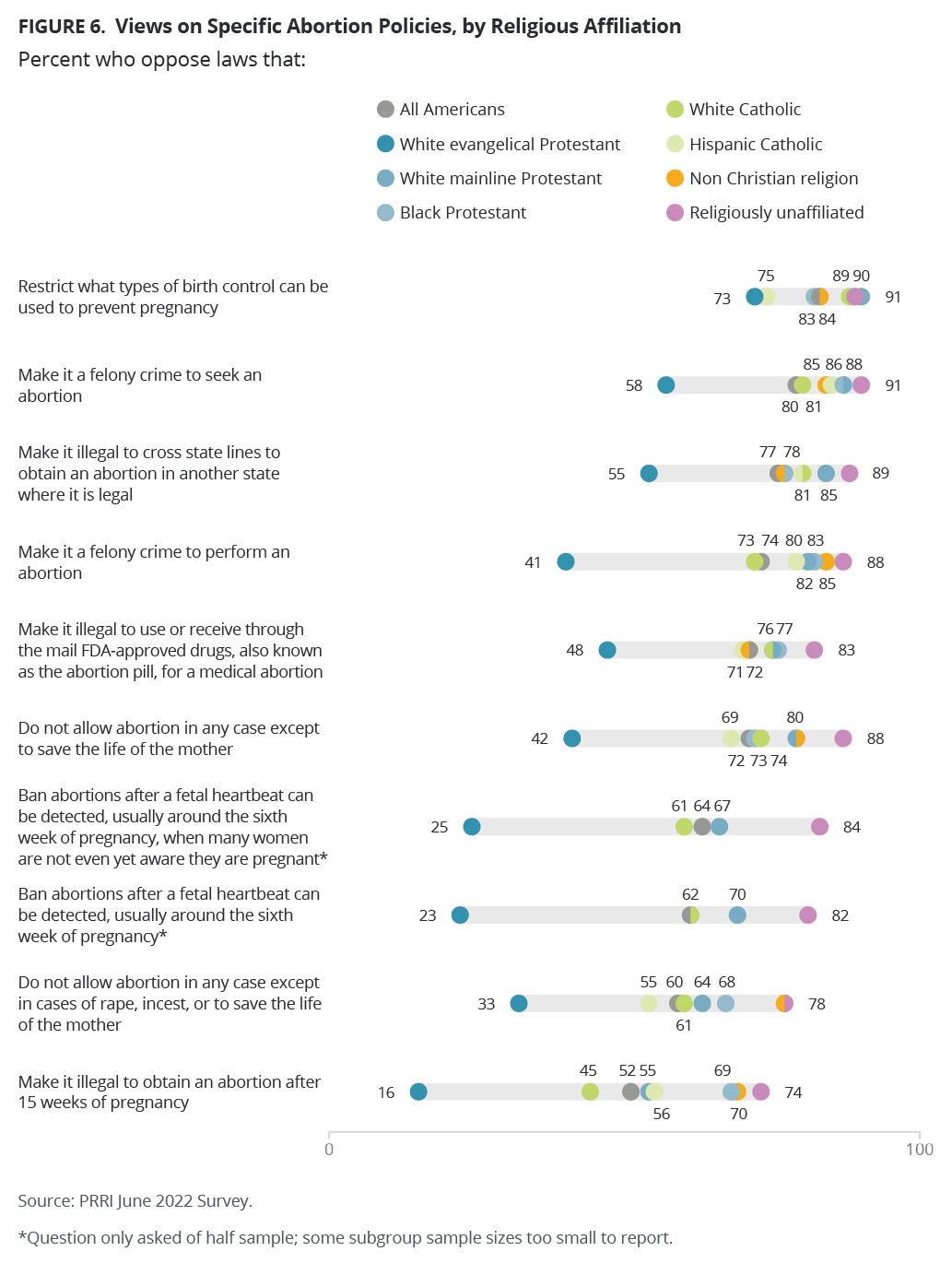
Social, Religious, and Political Impacts on Abortion Views
The Socially Acceptable View
Seven in ten Americans say it is more socially acceptable to be pro-choice than it is to be pro-life (71%), and 25% say the opposite. This belief is less common among Republicans, 55% of whom say it is more socially acceptable to be pro-choice and 41% of whom say it is more socially acceptable to be pro-life. Independents (73%) and Democrats (84%) overwhelmingly say being pro-choice is the more socially acceptable position.
Majorities of all religious affiliations say being pro-choice is more acceptable, but white evangelical Protestants (51%) are least likely to say this. Larger majorities of white Catholics (70%), white mainline Protestants (71%), Black Protestants (73%), Hispanic Catholics (80%), non-Christian religious Americans (80%), and religiously unaffiliated Americans (81%) say being pro-choice is more acceptable. Those who say religion is the most important thing in their life (50%) are less likely to say being pro-choice is the more socially acceptable position than are those who say religion is one of the most important things (67%), that it is not as important as other things (80%), or that it is not important (84%).
Among those who think abortion should be legal in most or all cases, 85% say being pro-choice is the more socially acceptable position, while 47% of those who think abortion should be illegal in most or all cases say the same.
Religious Influences on Abortion Views
Less than one-third of Americans (31%) agree that their religious faith dictates their views on abortion, while 66% disagree. A slim majority of Republicans (52%) agree with this statement, compared with 26% of independents and 20% of Democrats.
Not surprisingly, larger differences emerge by religious affiliation. Nearly three in four white evangelical Protestants (73%) say their religious faith dictates their views on abortion, compared with 33% of Black Protestants, 33% of white Catholics, 32% of Hispanic Catholics, 26% of white mainline Protestants, 20% of non-Christian religious Americans, and 7% of religiously unaffiliated Americans. However, views on the importance of religion also matter: 76% of those who say religion is the most important thing in their life agree that their faith dictates their views on abortion, compared with 44% of those who say it is one of the most important things, 13% who say it is less important than other things, and 4% who say it is not important at all.
Only 14% of those who say abortion should be legal in most or all cases agree that their religion dictates this view, compared with 65% of those who say abortion should be illegal in most or all cases.
The proportion of Americans who say their religious beliefs dictate their views on abortion is similar to the proportion who agree there would not be a debate about abortion if everyone held their religious beliefs (31%), compared with 66% who disagree with that statement. Not surprisingly, most of those who say their religion dictates their views on abortion also agree that there would be no debate about abortion if everyone held their religious views (65%). The vast majority of those who disagree that their religion dictates their views on abortion also disagree that the debate would not exist if everyone held their religious beliefs (84%).
Turning to Religious Leaders for Guidance on Abortion
Less than one in five Americans (16%) say they look to religious leaders for guidance on how to think about abortion. Republicans (30%) are more likely to do so than independents (14%) or Democrats (10%). White evangelical Protestants (38%) are more likely than any other religious group — including white Catholics (20%), Black Protestants (15%), Hispanic Catholics (13%), white mainline Protestants (11%), non-Christian religious Americans (6%), and religiously unaffiliated Americans (4%) — to agree that they look to religious leaders for guidance on abortion. Again, those who say religion is the most important thing in their life (46%) are most likely to agree that they look to religious leaders, compared to 22% of those who say it is one of the most important things, 7% who say it is less important than other things, and 2% who say it is not important at all.
Those who think abortion should be legal in most or all cases (7%) are much less likely than those who think abortion should be illegal in most or all cases (36%) to agree that they turn to religious leaders for guidance. Similarly, those who know someone who has had an abortion (13%) are less likely than those who do not (20%) to agree that they look to religious leaders for guidance on how to think about abortion.
Political Influences on Abortion Views
Only about one in five Americans (19%) agree that their political views dictate their views on abortion, compared to 77% who disagree. Republicans (19%) and independents (16%) are less likely to agree with this statement than Democrats (26%) are. There are few substantial differences across religious and demographic groups. There are also no significant differences across views on abortion legality or whether a person knows someone who has had an abortion.
Turning to Political Leaders for Guidance on Abortion
Few Americans (5%) agree that they turn to political leaders for guidance on how to think about abortion. Four percent each of Republicans agree with this, and 5% of each of independents and Democrats say they turn to political leaders for guidance on abortion. Again, there are few substantial differences by religion and demographics, although Black (7%) and Hispanic Americans (7%) are about twice as likely as white Americans (3%) to agree that they turn to political leaders for guidance on abortion.
Additionally, those who think abortion should be illegal in most or all cases (6%) are more likely than those who think abortion should be legal in most or all cases (4%) to agree that they turn to political leaders for guidance. Similarly, those who do not know anyone who has had an abortion (6%) are twice as likely as those who do know someone (4%) to say they look to political leaders for guidance on the issue of abortion.
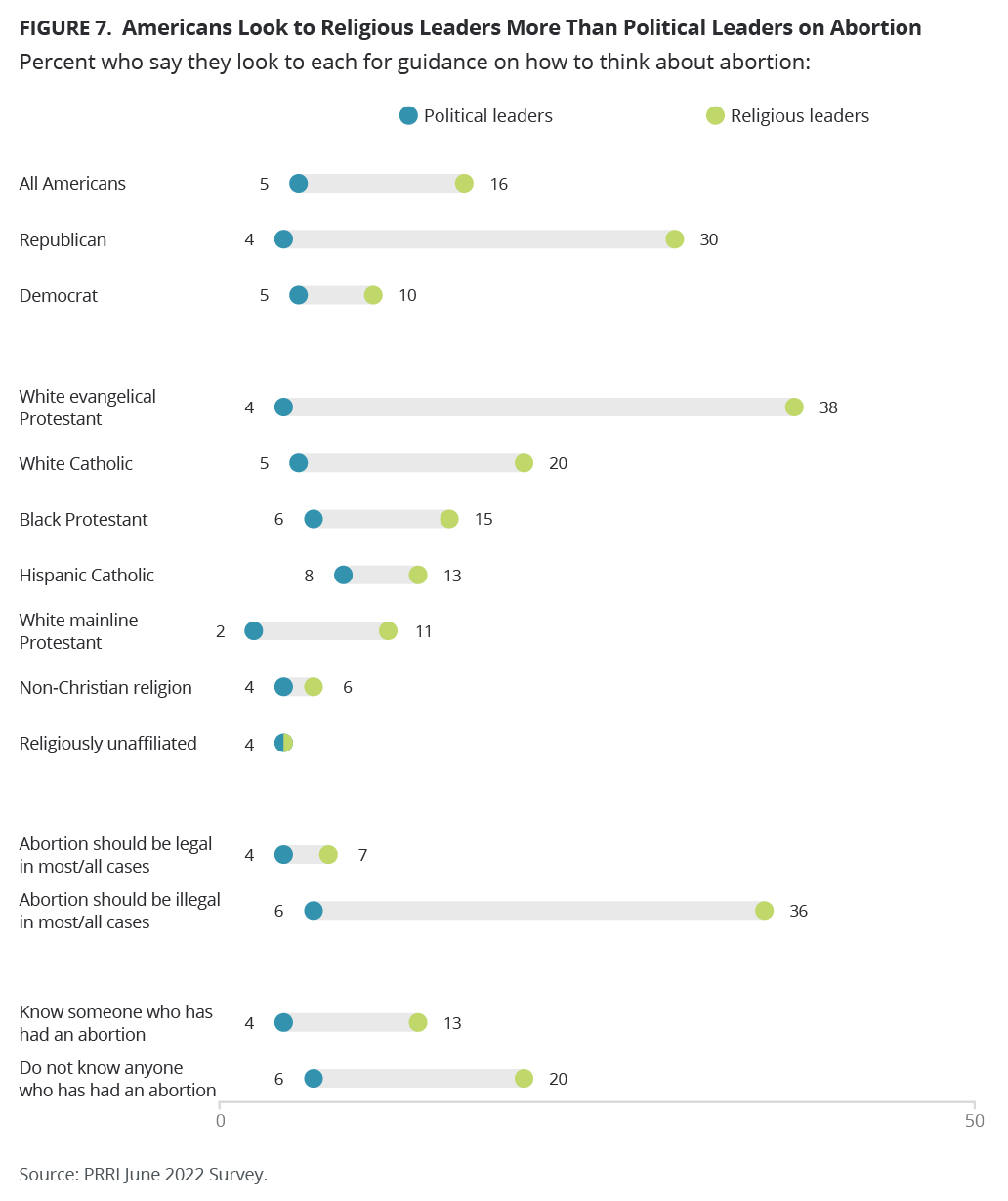
Survey Methodology
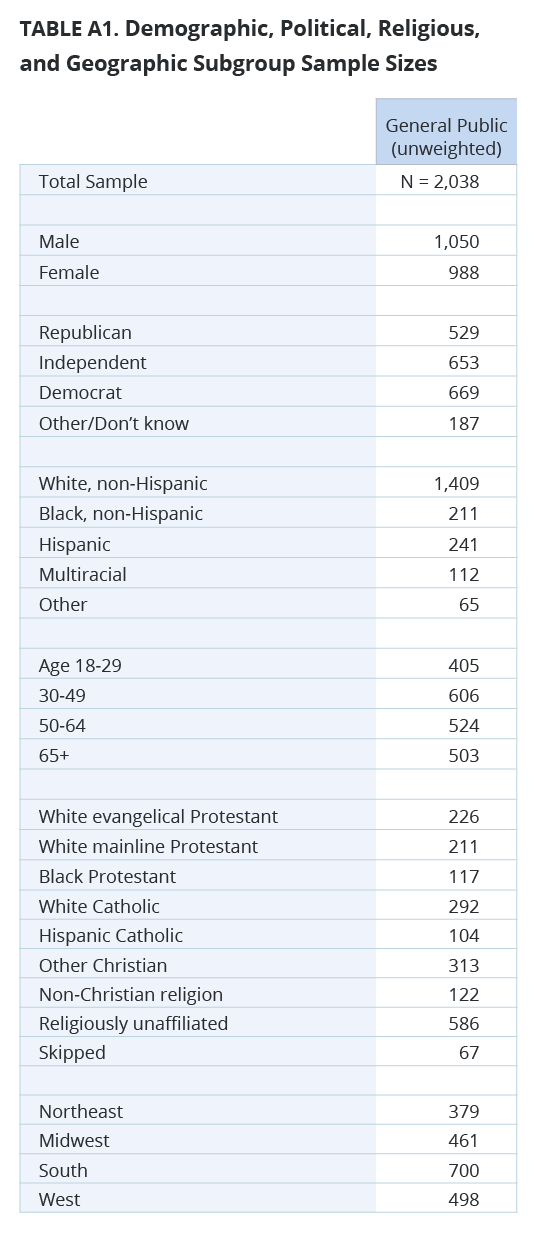 The survey was designed and conducted by PRRI among a random sample of 2,038 adults (age 18 and up) living in all 50 states in the United States who are part of Ipsos’s Knowledge Panel. Interviews were conducted online between June 24 and 26, 2022. The survey was made possible through the generous support of the David and Lucile Packard Foundation.
The survey was designed and conducted by PRRI among a random sample of 2,038 adults (age 18 and up) living in all 50 states in the United States who are part of Ipsos’s Knowledge Panel. Interviews were conducted online between June 24 and 26, 2022. The survey was made possible through the generous support of the David and Lucile Packard Foundation.
Respondents are recruited to the KnowledgePanel using an addressed-based sampling methodology from the Delivery Sequence File of the USPS – a database with full coverage of delivery addresses in the U.S. As such, it covers all households regardless of their phone status, providing a representative online sample. Unlike opt-in panels, households are not permitted to “self-select” into the panel; and are generally limited to how many surveys they can take within a given time period.
The initial sample drawn from the KnowledgePanel was adjusted using pre-stratification weights so that it approximates the adult U.S. population defined by the latest March supplement of the Current Population Survey. Next, a probability proportional to size (PPS) sampling scheme was used to select a representative sample.
To reduce the effects of any non-response bias, a post-stratification adjustment was applied based on demographic distributions from the most recent American Community Survey (ACS). The post-stratification weight rebalanced the sample based on the following benchmarks: age, race and ethnicity, gender, Census division, metro area, education, and income. The sample weighting was accomplished using an iterative proportional fitting (IFP) process that simultaneously balances the distributions of all variables. Weights were trimmed to prevent individual interviews from having too much influence on the final results. In addition to an overall national weight, separate weights were computed for each state to ensure that the demographic characteristics of the sample closely approximate the demographic characteristics of the target populations. The state-level post-stratification weights rebalanced the sample based on the following benchmarks: age, race and ethnicity, gender, education, and income.
The margin of error for the national survey is +/- 2.3 percentage points at the 95% level of confidence, including the design effect for the survey of 1.1. In addition to sampling error, surveys may also be subject to error or bias due to question wording, context, and order effects. Additional details about the KnowledgePanel can be found on the Ipsos website: https://www.ipsos.com/en-us/solution/knowledgepanel
Endnotes
[1] Sample sizes for Black Protestants and non-Christian religious Americans are too small to report.
Recommended Citation
“Political and Religious Activation and Polarization in the Wake of the Roe v. Wade Overturn” PRRI (July 7, 2022). https://www.prri.org/research/political-and-religious-activation-and-polarization-in-the-wake-of-the-roe-overturn